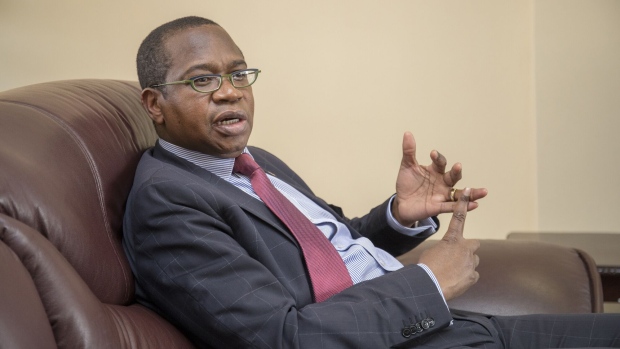Apr 17, 2024
Zimbabwe Hopes to Start Staff-Monitored IMF Program This Year
, Bloomberg News

(Bloomberg) -- Zimbabwe, banished from capital markets since 1999 for defaulting on its debt, hopes to deepen ties with the International Monetary Fund later this year as it seeks to clear billions of dollars in arrears.
“It is our hope that in the second half of the year we’ll be able to sign on to a staff monitored program with the IMF,” Finance Minister Mthuli Ncube said in a Bloomberg Television interview on Wednesday in Washington. That “will then buttress some of the reforms on the economic front.” He was in Washington to attend the Spring meetings of the IMF and World Bank.
The southern African nation launched a gold-back currency called the ZiG earlier this month to replace the battered Zimbabwean dollar — its sixth effort to stand up a stable domestic unit since 2008.
Ncube said the new currency, which stands for Zimbabwe Gold, was part of the reform process. Other measures include abandoning the death penalty and compensating farmers who were pushed off their land during the years of former President Robert Mugabe.
The country has been trying to restore its international standing despite qualms in western capitals about its human rights record. While the US has lifted sanctions on some state-owned firms, it’s applied them to President Emmerson Mnangagwa and other top officials.
Still, talks with the IMF have been making progress, with discussions about a staff-monitored program getting underway last year.
IMF Managing Director Kristalina Georgieva said in an April 15 statement posted on X that it was ready to work with the nation “to restore macroeconomic stability and reengage with the international community, which are essential for accessing external financing.
Read More: ZiG Debuts in Zimbabwe’s Sixth Effort at a Revamped Currency
Ncube, a former chief economist at the African Development Bank, said that if everything went according to plan, Zimbabwe hopes to identify sponsors within 18 months for a $2 billion bridge loan.
The tool, which has previously been used by Somalia and Sudan, would allow it to clear arrears with the World Bank, AfDB and European Investment Bank, the county’s preferred creditors, who it will tackle first in a wider debt restructuring.
Turning to the economic outlook, Ncube said that the drought withering southern Africa was a clear risk to growth.
He noted that the economy was only forecast to expand 3.5% in 2024, compared with an average of 6.8% over the last three years, and that forecast will be re-assessed in two months’ time.
“The downside risk is a lot higher now than before,” he said.
--With assistance from Ray Ndlovu and Godfrey Marawanyika.
©2024 Bloomberg L.P.






